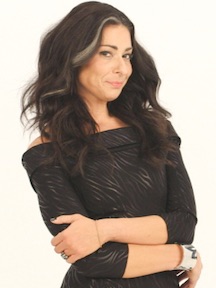By Jacqueline Knirnschild
As an advocate for body inclusivity, small business, and mental health, fashionista Stacy London (ΦBK, Vassar College), who is best known for hosting reality show What Not to Wear, is lauded as one of the most soulful people in the industry.
“Fashion is not something solely superficial,” London said in a recent interview for Hazmat Hotel podcast. “It’s more about self-expression, how we want to be seen in the world and build self-esteem.”
Born and raised in New York City, London graduated with a double major in 20th-century philosophy and German literature from Vassar College. During a summer internship in Paris with Christian Dior’s public relations department, London became serious about pursuing a career in fashion, and after college, she landed a job as a fashion assistant for Vogue magazine.
“Vogue was very hard. I don’t regret it. It was better than Navy SEAL training,” London said in an interview with HuffPost. “You learn everything you need to know about being in fashion. The word impossible doesn’t exist if you work for somebody like Anna Wintour.”
In 2002, London began co-hosting TLC’s What Not to Wear with Clinton Kelly, which was a huge hit and ran for more than ten years. In the makeover show, London and Kelly confront a so-called style felon, who was nominated by family or friends, and offer that person $5,000 to buy a new wardrobe—that is, only if the contestant throws out her entire current wardrobe and agrees to be subjected to the bold, honest, and razor-sharp critique of London and Kelly.
In an interview with Entertainment Weekly, London said that What Not to Wear is so much more than a caterpillar-to-butterfly transformation, it hits on a level of emotional relatability. “We all understand what it’s like to feel insecure and overcompensate.”
In one of London’s favorite episodes, a toe-sock and t-shirt wearing 20-year-old musician, named Meghan, blossoms into a mature woman with fitted suits, collared blouses, and heels. “I feel alive, like I can go and just rock out!” Meghan said upon the makeover reveal. “In the future, I’m going to continue doing my thing, but do it with more confidence.”
London has written two books about how clothes can change the way you feel about yourself and makes sure to include tips for all body types. “Your closet needs to be a place of joy and celebration of who you are now—not who you were,” London said in an interview with SFGate.
In 2017, in partnership with the Meijer’s style team, London launched an affordable clothing line for women of all ages and sizes. “There’s a common misbelief that trends only look good on a specific body type or are limited to youth,” London said in an interview. “There are no limits. You can wear a trend regardless of your age or body type. I love helping women connect the dots.”
As someone who struggled with psoriasis as a child, anorexia in her 20s, and depression in her late 40s, London is familiar with the harms of deep-seated insecurity and now hosts a podcast about mental health, called “Could Be Better, tbh.” In the podcast, London talks to celebrities and advocates who are embracing hope, kindness and empathy to navigate difficult situations. Past topics have included suicide prevention, bullying, and chronic illness.
London was diagnosed with psoriasis, which causes skin cells to build up and form itchy, dry patches, when she was four. One morning, when she was eleven, London woke up covered in red scales from the neck down and with a grey streak in her hair. Instead of dying it, London decided to keep the grey streak as an emblem of her perseverance. The streak has since become iconic and when she was the spokesperson for Pantene, she even had a clause that they couldn’t dye her grey streak. “It’s a part of me!” London said in an interview.
London now spends her time curating collectible vintage items for the small Instagram business that she owns with her partner. London describes the business, “Small Beautiful Things,” as “conscious clutter (with a conscience).” And during this era of Coronavirus, London is also busy doing philanthropy work. London is a spokesperson for ROAR for Women, which raises emergency relief funds for at-risk child care centers serving essential workers throughout the pandemic. She also hosted an online event to promote shopping at small businesses and raised money for immigrants in need during this crisis.
London thinks that this pandemic and the disruption of the global economy could end up exposing the exploitative manufacturing processes that fuel the fast-fashion industry. “We need to be more educated consumers,” London said in a recent interview, “and create a collective of smaller designers to help bigger companies make fair labor practices.”
Jacqueline Knirnschild is a graduate of the University of Mississippi, where she studied creative writing, anthropology, and Chinese. The University of Mississippi is home to the Beta of Mississippi chapter of Phi Beta Kappa.




